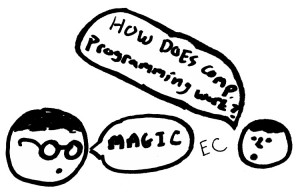I find trying to explain my work at family reunions to be a weird affair. Some relative or other will inevitably ask about my hobbies, and then the conversation usually goes something like this:
“Oh, I do a lot of work with the Raspberry Pi.”
They look at me quizically.
“The raspberry…. pie.”
“Yeah, that. And Arduinos, Beaglebones, PICs…”
“I’m sorry, what are we talking about? I thought you said you were working with some kind of pastry.”
I forget sometimes how the circuits that form my day to day life are not even remotely ubiquitous for the average person, though I think it would be a lot easier if their parent companies didn’t give them the weirdest names they can think up (the “Teensy” chip? Really?).
But if you are as confused as my baffled aunt by my references to bones and tart bakery products, I will clarify. The Raspberry Pi is not a pie, it is a computer – a very small, open-source computer that can fit in the palm of your hand but can handle nearly the same workload as the Dell Inspiron I did grade school homework on nearly a decade ago.
Computers like the Raspberry Pi are popular among the hobbyist communities for their clear advantages in size, ease of use, and computational power. Using only a tiny green board covered in modules and metallic processors, you can build nearly anything without the need for an EE degree – robots, cameras, phones, smart furniture, bizarre musical instruments…
These devices are platforms for a massive open source development community that favors sharing over secrecy, so all you need to succeed is enthusiasm and Google. Simply research some similar projects, learn or brush up on your Python coding, and get started.
It’s this attitude of collaboration and self-education that’s allowing the non-commercial innovation sphere to boom. Where once you would have needed to know specific and secretive corporate assembly languages to program a microcomputer, the code is now available for anyone who bothers to look it up in a search engine along with sites like Codeacademy or the Arduino community pages that help you learn the syntax.
Where once you would have needed a fabrication lab to build supports and moving parts, 3D printers can now construct your prototype from software alone. And the internet gives us the freedom to share these designs with the world, letting anyone else with similar enthusiasm take on the mantle and improve these projects with their own ideas.
That’s not to say it’s all fun and games. Motivation is a skill in and of itself, and the expectation that you teach yourself can be a significant hurdle for many prospective tech hobbyists.
The sheer variation in available tech can be intimidating as well – is a Raspberry Pi the right choice for your robot? Or an Arduino? Should you 3D print parts or try to buy them? Without experience, it’s possible to veer off your design plan, running into a discouraging string of failures that can’t seem to be pinned down. And since there’s no academic oversight or official set of corporate rules, these failures can seem insurmountable.
The answer to this, of course, is that failures are how you learn. That’s a hard concept to remember when you’re knee deep in errors, but there’s no place it’s more important than the hobbyist engineering community. If you’re having problems, somebody else probably is too, and thus entire communities have emerged to assist those with technical difficulties.
Can’t fix a linux bug? Post it to Stack-Overflow, a Q&A site run entirely by the collaboration of volunteer code junkies. Trying to decide between microcomputers? The folks on the Arduino and Raspberry Pi forums will be happy to assist. And if your design is brilliant, bring it back to the community, and let others learn from you.
Engineering your own designs can be more rewarding and educational than any simplistic class-assigned project. The parts are cheap (most microcomputers go for under $50), the coding is simple to learn, and the communities are helpful and inclusive.
Owning your design will give you a greater grasp over the concepts of any branch of engineering, whether you’re computer, electrical, civil or mechanical. And the skills you learn may be desirable to institutions that care about more than what you learn in the rigors of the classroom.
But more than anything else, you are the measure of whether a project succeeds or fails. Perhaps a greater skill than any host of programming or machining experience is the ability to motivate yourself and persist past your failures. If you can practice that, everything else will fall into place eventually.
Happy hacking!
Copeland is a member of the class of 2015.




